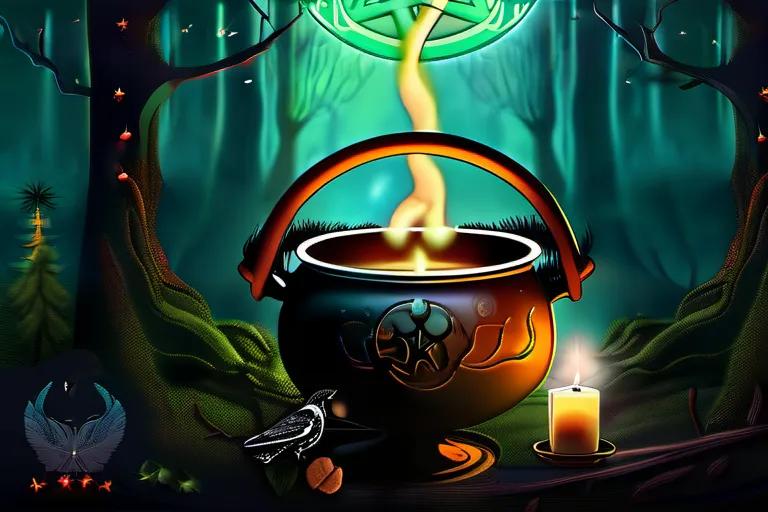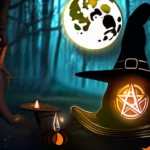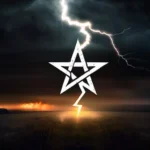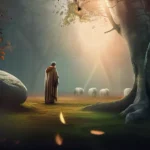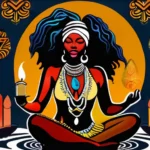Explore the fundamental beliefs, practices, and deities in Wicca, a modern pagan religion.
Welcome to our comprehensive guide on understanding the core beliefs of Wiccan deities. In this article, we will delve into the intricate world of Wicca, a modern pagan religion that has gained significant popularity in recent years. We will explore the fundamental beliefs, practices, and deities that form the foundation of this fascinating belief system.
The Basics of Wicca: An Overview
Wicca, often referred to as ‘the craft,’ has its roots deeply embedded in ancient pagan traditions and practices. Imagine if you will, a tapestry woven from threads of nature worship, spiritual equality, and a deep connection to the divine. Wiccan beliefs revolve around the balance between light and dark, life and death, creation and destruction – much like the circle of life. But what exactly are these core beliefs that shape this modern pagan religion?
Wicca’s History:
‘Where did it all begin?’ you might ask. Wicca as we know it today was largely popularized by Gerald Gardner in the 1950s, but its origins trace back much further.’ It draws from a mix of ancient practices, medieval traditions, and modern interpretations to form a unique spiritual path.
The term ‘Wicca’ itself is derived from Old English and means ‘wise one,’ highlighting the importance of wisdom and knowledge in this religion. This wise one, or witch, holds sacred power, but it’s not just about magic – it’s a profound connection to nature and the divine.
The Fundamental Principles:
‘What does a Wiccan believe in?’ The fundamental principles revolve around the Wiccan Rede: ‘An it harm none, do what ye will.’ This ethical guideline suggests that one should live their life freely and responsibly without harming others or nature.’
The concept of magick, with a ‘k,’ emphasizes the power to influence reality through will. It’s not about casting spells for personal gain but using this energy for positive change and self-improvement.
A ‘circle’ is central to Wiccan practices, symbolizing the unity of all things within a sacred space.’ It’s more than just a ritualistic act; it’s a way of living in harmony with nature and the cosmos.’
Understanding these core beliefs provides a foundation for exploring the deities that play a significant role in Wiccan practices. The next chapter will delve into the Triple Goddess and Horned God, delving deeper into their roles and significance within this spiritual journey.
Wiccan Deities: The Triple Goddess and the Horned God
The Wiccan deities, particularly the Triple Goddess and the Horned God, are central to understanding this modern pagan religion’s rich tapestry of beliefs. How do these figures shape a practitioner’s worldview? Are they merely mythological beings or embody deeper spiritual truths?
The Triple Goddess represents the cyclical nature of time and the natural world in Wiccan teachings. She is often depicted as the Maiden, the Mother, and the Crone, each symbolizing different aspects of life’s journey.
- Maiden: This phase embodies youth, new beginnings, and the potential for growth. Just like the dawn, the Maiden stands for freshness and purity, reminding us to embrace our vitality and curiosity.
- Mother: The Mother is the nurturing force, the one who gives life and sustains it. She symbolizes fertility, creativity, and wisdom. In her form, we see the fullness of experience, the richness that comes from the heart.
- Crone: Often misunderstood as a figure of death or decay, the Crone is actually the keeper of ancient knowledge and the one who guides us towards understanding our own mortality. She teaches about endings, transformation, and the wisdom that comes with age.
The Horned God complements the Triple Goddess by representing masculinity and the natural world in a different way. He embodies the wild, untamed power of nature, fertility, and sexuality. Together, these deities form a balanced duality that mirrors the interconnectedness of all aspects of life.
By worshipping the Triple Goddess and the Horned God, Wiccans honor the cyclical nature of existence, embracing the balance between light and dark, birth and death. These deities serve as powerful symbols for personal growth, transformation, and the cyclical journey through life’s phases. How do these archetypes resonate with your own spiritual beliefs and experiences?
Understanding the roles of the Triple Goddess and the Horned God can deepen one’s practice in Wicca, providing a framework that guides rituals, magic, and daily living. As you explore these deities further, ask yourself: What lessons do they offer? How can their wisdom enrich your spiritual path?
Through this exploration, we uncover not just mythological figures but profound metaphors for the human experience. The Triple Goddess and the Horned God are more than just deities; they are keys to unlocking deeper insights into ourselves and our place in the universe.
The Wheel of the Year: Wiccan Sabbats
Imagine walking through a lush, green forest as autumn leaves crunch under your feet. The air is crisp and carries whispers of change. This season marks one of the eight Wiccan Sabbats known as Mabon. In the Wiccan calendar, these holidays are like chapters in an ever-turning book, each holding a unique story and significance.
What are the Wiccan Sabbats? They are the turning points of the Wheel of the Year, marking key moments as nature evolves through the seasons. From the joyous celebration of Beltane, which symbolizes the peak of spring’s fertility and vitality, to the solemnity of Dissolution, a time when the veil between worlds is thin, these holidays form the backbone of Wiccan spiritual practice.
Why are they important? Each Sabbat serves as a reminder of the interconnectedness of all things. By honoring the cycles of nature, Wiccans align their lives with the natural world, fostering a deep sense of harmony and balance. Think about it—just like the sun sets each day, so too do these holidays mark endings and new beginnings.
- Imbolc: Celebrated around February 1st, this is the time when nature begins to stir from its winter sleep, marking the start of spring.
- Easter: Known as Ostara, it’s a celebration of rebirth and new life, much like the dawn of spring itself.
- Yule: On the longest night of the year, this is a time for reflection and renewal, just as winter solstice signals the start of longer days ahead.
- Vesak: Also known as Beltane, it’s a time to celebrate love, fertility, and creativity, as the earth bursts into full bloom.
- Litha: During this summer solstice celebration, the sun reaches its highest point in the sky, symbolizing peak vitality and warmth.
- Lesser Sabbats: These include Mabon (autumn equinox) and Dissolution (winter solstice), marking balance and endings respectively. Each offers a unique perspective on the year’s cycle, inviting introspection and ritual practice.
- Hallowmas: Celebrated around November 1st, this holiday honors the ancestors and the harvest season, reflecting on the gifts of nature and community.
Each Sabbat is more than just a date; it’s an invitation to experience the divine in every moment. As you step into the wheel’s next chapter, consider how these holidays can guide your spiritual journey, making each day a celebration of life’s endless cycle.
Wiccan Magick: Principles, Tools, and Spells
Understanding the Core Beliefs of Wiccan Deities: A Comprehensive Guide
Wicca, a vibrant and modern form of pagan religion, revolves around the worship of deities who represent various aspects of nature and life. But what exactly do these core beliefs encompass? How do they shape the spiritual practices of Wiccans?
Imagine walking through a dense forest, where each tree whispers tales of ancient wisdom. In Wicca, every deity is like one of those trees, with its own story and significance. For instance, Diana, the goddess of the moon, holds much power in guiding intuition and nurturing emotions—she’s like the light that guides us through dark times.
Wiccans believe in a balance between male and female energies, symbolized by the Horned God and Diana. This duality is akin to day and night, yin and yang. The Horned God represents strength and passion, while Diana embodies wisdom and purity—both are necessary for harmony in life.
The Wheel of the Year, with its eight sabbats, celebrates the cycles of nature and the changing seasons. But this ritualistic calendar is more than just a clock; it’s a living entity that influences the spiritual practices throughout the year. Each sabbat brings forth new spells and magickal workings to enhance these natural cycles.
In Wiccan magick, principles such as the Law of Three (actions have consequences) are central. Every spell cast must be done with intent and respect for the outcome, much like planting a seed requires care and attention. Tools used in Wicca include candles, crystals, and herbs—each chosen to amplify the energy needed for the spell.
Common spells can range from simple love charms to complex protection rituals. For example, a Protection Spell might involve creating an amulet using black obsidian and white sage, symbolizing strength and purification. Another, perhaps more whimsical, is the Lucky Handkerchief Spell, where one ties seven knots in a handkerchief to bind good luck to oneself—like securing a gift wrapped with care.
Through these spells and rituals, Wiccans seek to harmonize their lives with nature’s cycles, making every moment count. Just as a gardener nurtures plants to bloom, Wiccans strive to cultivate their spirituality and personal growth through these ancient practices.
Ethics and Morality in Wicca
How do Wiccans navigate their daily lives and make decisions? The ethical guidelines and moral principles that guide them are as essential to their practice as the spells they cast. These beliefs are not just a set of rules but a way of life, a framework for understanding the world and our place in it.
Wicca emphasizes the concept of wicce wise, which means using wisdom and discernment in all actions. This is akin to walking through a dense forest where every step requires careful consideration—choosing paths that are not only safe but also aligned with one’s values. Wiccans believe in living harmoniously within nature, seeing themselves as part of the great web of life rather than separate from it.
One of the core ethical guidelines is the law of threefold return. This means that whatever energy or action you send out into the world will come back to you multiplied by three. It’s like planting a seed; what you sow, you shall reap, often in unexpected and amplified ways. This principle encourages thoughtful and considerate behavior because every choice has consequences.
Another key principle is harm none. This mandate emphasizes the importance of considering the impact of your actions on others. It’s a reminder to tread lightly, respecting the boundaries and autonomy of all beings, be they human or non-human. This principle ensures that each action serves a positive purpose without causing harm.
Wiccans also emphasize the concept of welcoming spirit, inviting benevolent energy into their lives through acts of kindness and compassion. It’s about opening oneself to love, light, and positive energies, much like planting seeds of positivity that grow into a lush garden of well-being.
These ethical guidelines are not just theoretical; they are lived every day, influencing decisions in mundane tasks as well as profound spiritual practices. By integrating these principles into their lives, Wiccans strive to create a world that is more balanced and harmonious for all beings.
Wiccan Practices: Rituals, Meditation, and Divination
Understanding Wiccan practices can be like unraveling a complex tapestry, each thread representing different rituals, meditations, and divination techniques that woven together form a rich, spiritual fabric. Let’s dive into these practices to see how they enrich the lives of those who follow this path.
Rituals in Wicca are much more than just symbolic actions—they’re vibrant expressions of the divine within us all. Consider the Wheel of the Year, a cycle that mirrors nature’s rhythms through festivals like Samhain, Yule, and Ostara. Each ritual is a celebration of life’s cycles, offering an opportunity for personal reflection and communal bonding. Think about it—why not embrace the magic of changing seasons with a bonfire and spellwork?
Meditation in Wicca serves as a bridge between the physical and spiritual realms. Techniques like grounding meditation help practitioners connect deeply with the earth, fostering a sense of stability and grounding. Imagine sitting on a quiet hill, feeling the Earth’s energy seeping into your body—doesn’t that sound like a refreshing break from the chaos of daily life? These practices can also aid in achieving states of clairvoyance, enhancing one’s ability to see beyond the physical.
Divination is another fascinating aspect, often associated with tools such as tarot cards and runes. Using these tools isn’t just about predicting the future; it’s a way of exploring the present moment through multiple lenses. For example, drawing tarot cards can provide insights into personal challenges or offer guidance on decision-making. Can you imagine how insightful and empowering it would be to see different perspectives on your current situation?
By engaging in these practices, Wiccans create a harmonious balance between their inner world and the natural environment around them. It’s like crafting a beautiful garden where each plant symbolizes a part of our spiritual journey.
Conclusion
 In conclusion, understanding the core beliefs of Wiccan deities requires an open mind and a willingness to delve into the rich tapestry of this ancient religion. By gaining insight into the beliefs, practices, and deities of Wicca, you will have a deeper appreciation for its unique place in the pantheon of world religions.
In conclusion, understanding the core beliefs of Wiccan deities requires an open mind and a willingness to delve into the rich tapestry of this ancient religion. By gaining insight into the beliefs, practices, and deities of Wicca, you will have a deeper appreciation for its unique place in the pantheon of world religions.

